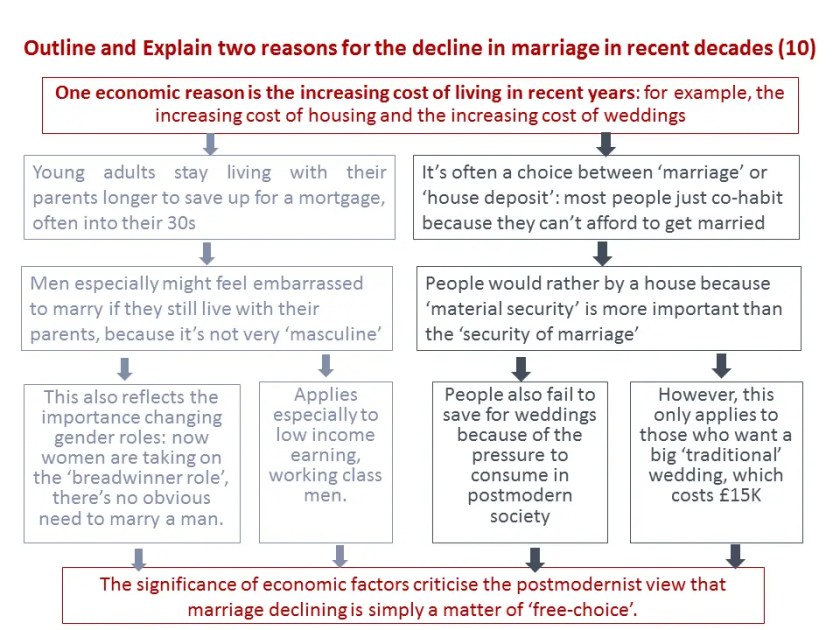Last Updated on May 3, 2018 by Karl Thompson
A model answer to a possible 10 mark ‘outline and explain’ question, written for the A-level sociology AQA A-level paper 7192/2: topics within sociology: families and households section).
Question
Outline and explain two social changes which may explain the decline of marriage in recent decades (10)
Model Answer
The first social factor is in more depth than the second.
Economic changes such as the increasing cost of housing and the increasing cost of weddings may explain the decline of marriage:
Young adults stay living with their parents longer to save up for a mortgage, often into their 30s. Men especially might feel embarrassed to marry if they still live with their parents, because it’s not very ‘masculine’. This also reflects the importance changing gender roles: now women are taking on the ‘breadwinner role’, there’s no obvious need to marry a man. This applies especially to low income earning, working class men.
Furthermore, it’s often a choice between ‘marriage’ or ‘house deposit’: most people just co-habit because they can’t afford to get married. People would rather by a house because ‘material security’ is more important than the ‘security of marriage’. People also fail to save for weddings because of the pressure to consume in postmodern society. However, this only applies to those who want a big ‘traditional’ wedding, which costs £15K.
The significance of economic factors criticise the postmodernist view that marriage declining is simply a matter of ‘free-choice’.
A Second reason for the decline of marriage is secularisation, or the decline of religion in society.
Christianity, for example emphasises that marriage is a sacred union for life before God, and that sex should only take place within marriage. With the decline of religion, social values have shifted so that it is now acceptable to have sex before marriage, and with more than one partner, meaning that dating, serial monogamy and cohabitation have all replaced marriage to a large extent.
The decline of religion also reflects the fact that marriage today is not about ‘pleasing society’, it is simply about pleasing the two individuals within the relationship, the ‘pure relationship’ is now the norm, and people no longer feel like they need God’s approval of their relationshp, so there is less social pressure to get married.
However, this trend does vary by ethnicity, and Muslims, Hindus and Jews within Britain are all much more likely to get married in a religious ceremony.
Visual Version for social change one:
Other posts you may find useful:
- To review the marriage topic please see this post: explaining the changing patterns of marriage
- For advice on paper 2 (which includes the families and households topic) please see this post.


